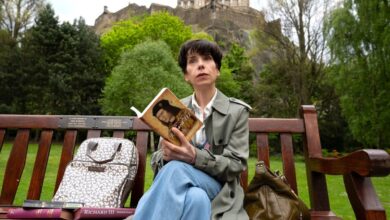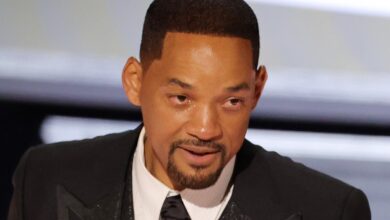‘You’ll never see Michael Caine blink’: An oral history of The Muppet Christmas Carol at 30

There are Christmas movies, then there’s The Muppet Christmas Carol. In the years since its arrival in 1992, this surprisingly dedicated adaptation of Charles Dickens’ defining redemption story has emerged as a modern classic, dripping with nostalgia and indelibly linked to the childhood of a generation thanks to countless festive repeats. Full of memorable moments, beloved songs and that warm, fuzzy, festive feeling – for many, it’s just not Christmas until you’ve seen a frog in a top hat teach Michael Caine’s Scrooge the importance of empathy.
But beneath Kermit’s compassion and Ebeneezer’s humbugs lies an equally restorative tale of how Christmas saved the Muppets during their darkest hour. Reeling from the sudden death of Jim Henson, the company’s troupe of performers and its new de facto leader, Jim’s son Brian Henson, were left with a looming question: can this gang of frogs, bears, chickens – and whatever the heck Gonzo is – continue without their fearless leader? Combining all the humour, heartbreak and hope that made the Muppets so special, The Muppet Christmas Carol proved that Jim Henson’s work not only can continue without him – but it should.
As this seasonal classic turns 30, we gathered some of its key players – including director Brian Henson, Gonzo performer Dave Goelz, young Scrooge Raymond Coulthard, Cousin Fred Steven Mackintosh and singer of the legendary missing song “The Love is Gone” (more on that later) Meredith Braun – to reflect on the creation and legacy of this Christmas gift that keeps on giving…
‘We were utterly shocked when Jim passed away – he was stronger than any of us’
Following Jim Henson’s sudden death on 16 May 1990 from severe pneumonia, the future of the Muppets was left in limbo. His son, Brian, gathered performers for an emergency meeting and discovered they’d like to continue what had become their life’s work – but the question remained: what next?
Brian Henson (Director): It was all very risky. Even my dad wasn’t sure what to do next with the Muppets. When he died, he was selling the company to Disney and his big thing was that he was going to do Muppet attractions at Disney World. He was getting very excited about that because I think he was unsure where to go next with the movies. They were tough because you’re trying to tell an original story but with each movie, it was getting a little bit tricky. How do you let these characters be fresh? You fall into ruts.
Dave Goelz (Gonzo): We were utterly shocked when Jim passed away. He looked frail, he was thin and almost looked gaunt sometimes but he was stronger than any of us. He could outpace anybody and work harder than everybody else, so the idea that he could succumb to something was the furthest thing from our minds. We just couldn’t imagine it. Going forward, we collectively decided that we would try to see if we could keep doing this – and this was our first major project after that decision.
Henson: To start, we were thinking we were going to parody A Christmas Carol. Frankly, we thought we had to follow the Muppet comedy formula where there are two jokes that’ll make people laugh out loud on every page of the script and the story is less important but there must be heartfelt moments. It was really Jerry [Juhl, writer] saying, “We can’t parody this. It’s too good. We just have to do it – and I think we can do it better than anyone.”
Goelz: We felt an enormous bond and really wanted to do this film because of what it said about humanity. Luckily, Brian and his siblings were willing to go ahead and try – and I’m so glad we did.
Henson: Jerry loved Gonzo so much and at the time I was also a huge fan of Gonzo. I always felt there’s so much of Gonzo that we all want to know more about. Jerry loved Dickens’ prose so much and wanted to get Gonzo in a movie but couldn’t figure out where to put him, so he said, “Can we have Gonzo be Charles Dickens and use a ton of dialogue?” I think his script is around 98 per cent Dickens prose. Almost never does he veer from it. 98 per cent is probably too high… but it’s mostly Dickens’ prose.
Goelz: Jerry and I became very good friends and he could see the changes that were happening to me as I grew and went through therapy. He’d always tried to work as unconsciously as he could so he just thought, “I really need that narrative prose in there and I don’t want to have a narrator… how could we inject it in a way that would work?” Somehow, he thought of Gonzo and then with Gonzo’s sidekick Rizzo [performed by Steve Whitmire], it worked beautifully.
Henson: It’s sort of a rule of thumb that you don’t ask a puppet character to be alone in scenes because you need a foil so we put Rizzo right there with Gonzo. That choice really guided so many decisions. Then it was like, “OK, we’re doing this for real with real commitment.” Nobody’s ever going to wink at the camera and say, “This is a movie, this isn’t real.” Kermit is going to be Bob Cratchit and nobody’s going to accidentally call him Kermit. Nobody’s going to wink at the camera and say, “Making movies is hard!” We’re just not going to do that.
Goelz: It was a great chance to deepen my work. Gonzo had gone through two phases before this. First, he was an outsider on The Muppet Show, which reflected how I felt about suddenly being in show business. Then he became bombastically enthusiastic about wild, explosive stunts, which was really fun. This was his third soulful phase that was the completion of his character. The characters all come from inside of us so I guess I had that in me at this point in my life. I didn’t have it in the beginning but it was there now – and it worked out perfectly. It felt great for me. I’m so glad I got to play that part, it was a gift from Jerry.
Henson: It was liberating because it allowed us to treat the Muppets like Monty Python; an ensemble of brilliant performers that can be cast in a story – and the fact they have a lot of history between them influencing their relationships just became a plus. It allowed what had been baggage, making it hard for my dad to keep making Muppet movies, to become a plus too. It also made it an exciting way to go.
‘I hardly had to direct Michael Caine… he was usually two steps ahead of me’
Jim Henson in 1985
With their story set, production began at Shepperton Studios in June 1992 with screen icon Michael Caine stepping into the perpetual frown of Ebeneezer Scrooge opposite Kermit’s Bob Cratchit and a colourful cast of human and Muppet characters.
Raymond Coulthard (Young Scrooge): I went in to meet Brian and they did my make-up and put me in costume. We filmed some bits then Brian said, “Do you mind waiting around? I’d like Michael to meet you.” I was like, “Oh my God…” He sat me on this high stool in the middle of the studio. I had my eyes glued to the door waiting for Michael Caine to walk in. I waited and waited, then suddenly I heard this voice behind me say, “Oh, hello.” I turned around and there was Michael Caine. He shook my hand, turned to Brian and said, “Ah yeah. He’ll do.” And that was me with the job.
Henson: The whole movie is the contrast between Dickens and Henson. The production design is dark and moody Dickensian London but it’s also Muppety at times, and because Michael’s a very capable comedian and a very, very capable dramatic actor, he had the confidence to know that the right thing to do is to play it utterly dramatically. That way, Scrooge can lead the Dickensian influence in the film and Bob Cratchit can lead the Muppet influence. The fact that he’s such a good comedian is why he knew that by playing it straight, it’s going to be much more exciting – and funnier in places too.
Steven Mackintosh (Cousin Fred): I was in an episode of The Storyteller called “The Luck Child”, which was one of Brian’s early projects. Having seen me in that, he just cast me. I don’t think I auditioned. To be asked to do a Muppet film was a great honour. I came bouncing on set, got the costume on and somebody put these ridiculous curls in my hair. I was just marvelling at its scale and the way it was built on platforms for the muppet performers – there was this incredible Dickensian street. My first day was when I come bounding into Scrooge’s office with my exuberant energy. It was a total pleasure to watch Michael work and interact with the Muppets playing the Clarks.
Dave Goelz’s Gonzo in ‘The Muppet Christmas Carol’
Festive feast: The Muppets enjoy some Christmas dinner





